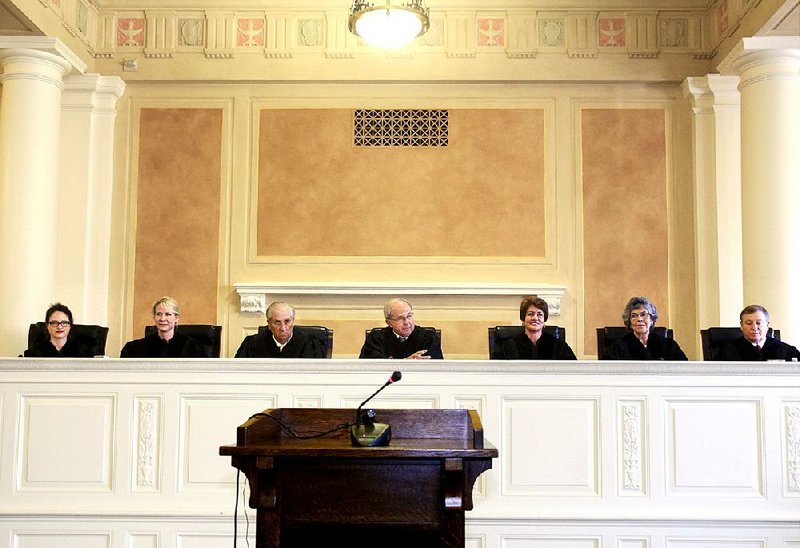The Arkansas Supreme Court on Thursday ruled that people charged with crimes can be held in jail in lieu of large, cash-only bail amounts. Dissenting justices argued such a rule was unconstitutional and adversely affected the poor. They even invoked the poetry of the Man in Black and his time in the Starkville city jail.
In a 5-2 decision, the state's high court ruled a Benton County circuit judge was right to set a $300,000 cash-only bail for a man facing several assault and battery crimes, because such a bail requirement is in keeping with those prescribed in the state constitution.
In a four-page dissent, Justice Jo Hart said the majority got lost in whether the defendant, Ramon Trujillo, now serving a 10-year sentence, "deserved" a cash-only bail.
Deserving or not, Hart wrote, the majority's ruling was "in contravention of the Arkansas Constitution" and "takes from the people the fundamental, absolute right to reasonable bail before conviction."
Chief Justice Howard Brill dedicated the first page of his dissent to six stanzas of Johnny Cash's "Starkville City Jail," a tale of the Arkansas native's arrest in Mississippi and subsequent overnight incarceration without any bail being offered.
Brill -- a Cash enthusiast who has taught continuing legal education courses titled Law from the Life and Music of Johnny Cash -- said that a cash-only bail has benefits and disadvantages but, regardless of policy, it violates the rights of defendants expressed in the state's constitution.
The case began after Trujillo's arrest, and eventual conviction, for second-degree battery after the beating of his 35-week-pregnant girlfriend and her infant son.
After his June 1 arrest, Trujillo was released from jail on a $25,000 bond but returned to jail after he violated the court's "no contact" order.
In July, Judge Robin Froman Green set Trujillo's bail at "$300,000 cash," with no option for a surety bond. Trujillo objected and in September the Supreme Court agreed to review the court's ruling.
State attorneys argued that Trujillo's case was moot because by November, he had pleaded guilty. Though the justices agreed the appeal of Green's order was moot, they agreed that, as a matter of policy that can affect other similarly situated defendants, they should consider the appeal.
Article 2, Section 8 of the Arkansas Constitution states "all persons shall, before conviction, be bailable by sufficient sureties, except for capital offenses, when the proof is evident or the presumption great."
Trujillo contended that "cash-only" runs contrary to the "sufficient sureties" language while state attorneys argued that cash can be counted as such.
In the majority's opinion, Justice Karen Baker notes that states are divided across the country on the cash-only question and conceded that a case in the Washington Supreme Court found that "surety contemplates a third-party arrangement" and that cash-only requirements were unconstitutional.
But Baker said the majority agreed with the reasoning used in a 2015 Wyoming Supreme Court ruling that found that bail existed as a means to ensure a defendant would return for trial and that the "sufficient sureties" language in the constitution includes a "broad range of methods" including cash.
Brill wrote that nationwide, the intent of constitutional protections for bail have routinely allowed for "surety" or some form of property other than cash to be used as collateral for a defendant's release from custody.
The Arkansas Constitution, contrary to the majority opinion, is no different, he wrote.
"Cash-only bail may have definite advantages ... on the other hand, cash-only bail has drawbacks. It may have an unfair, even disparate impact, upon lower income defendants without resources. Cash-only bail, particularly in larger amounts, may be used punitively," Brill wrote. "Requiring cash-only bail strips a person of his constitutional right to provide any sufficient surety for his release."
Hart argued the majority's ruling will hurt the state's most vulnerable.
"By affirming the imposition of cash-only bails, the majority creates and grants to the government an absolute right to incarcerate until the time of trial an accused who is not affluent," she wrote.
"This decision will disproportionally impact the poor, as well as those whose wealth is invested and do not have readily at their disposal large sums of cash."
Metro on 02/12/2016
